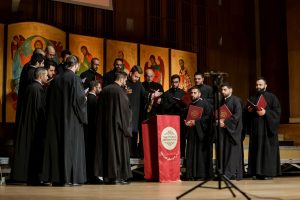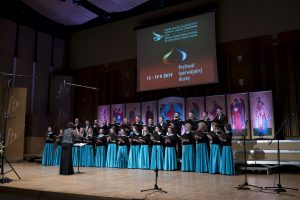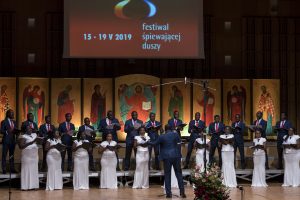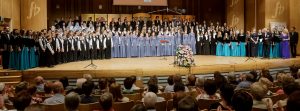International Festival of Orthodox Church Music – ‘Hajnówka’
International Festival of Orthodox Church Music – ‘Hajnówka’
A Secular Event Carried out by Secular Organizers
By Olga Pacewicz – Sleńdzińscy Gallery in Białystok – Departmental Head of Exhibitions Publishing, visual arts specialist, copywriter.
The International Festival of Orthodox Church Music, “Hajnówka”, in Białystok is organized by the “Orthodox Church Music” Foundation in Hajnówka, Poland.
The festival has been held annually since 1982. So far, 895 choirs from 41 countries from Europe, Asia, North America, Africa and Australia have participated in the Festival (Armenia, Australia, Belarus, Belgium, Bosnia and Herzegovina, Bulgaria, Cyprus, Czech Republic, Egypt, Estonia, Finland, France, Georgia, Germany, Ghana, Great Britain, Greece, Hungary, Italy, India, Iran, Israel, Kazakhstan, Kenya, Korea, Lebanon, Lithuania, Latvia, Macedonia, Moldova, Montenegro, Poland, Russia, Romania, Serbia, Slovakia, Switzerland, Sweden, Ukraine, United Arab Emirates, United States).
The festival takes place under the Patronage of the President of Poland, the Polish Ministry of Culture, the Artistic Patronage of professor Krzysztof Penderecki, (one of the most prominent contemporary composers) and the Patronage of Polish Composers’ Union.
The Festival is a secular event carried out by secular organizers. Even since the first idea of the event, organizers have never treated it as a religious festival. As such, during the Festival, Orthodox church music is performed by the choirs regardless of their nationality or religion – not only Orthodox church choirs, but also Catholic, Greek-Catholic, Protestant, Old-believers’, as well as Muslim, Buddhist and Jewish choirs. The openness of the Festival, the variety of repertoire and cultural diversity is an example of mutual respect and tolerance, confirming the idea of the Festival as the Musical Forum of East and West.

Orthodox Church music fulfils the human need to seek out profound experiences. While respecting canon, it also introduces into its local colour: autonomic sound – an emotional characteristic of the area where it’s created. In its structure one can find traces of contact with other cultures, echoes of different worlds. This “otherness in unity” which is a notable characteristic of Orthodox music and simultaneously its undeniable value, finds direct reflection on the repertoire presented during the Festival, also called the Festival of the Singing Soul. Orthodox Church music is performed by representatives of various nations, cultures and religions. The “artistic ecumenism” consciously and consistently achieved by the organizers of the Festival has become its calling card.
The Festival’s uniqueness lies also in the fact that it has discrete competitive categories for amateur choirs (parish, secular, children’s), musical academy choirs and, an international phenomenon, excellent professional choirs. It’s the only choir festival in Poland that pits professional choirs against one another. There is not a similar contest anywhere else in the world. The Festival also includes non-competitive concerts in different cities and areas of Poland, such as Warsaw, Krakow, Białowieża, or Krzysztof Penderecki’s European Music Center in Lusławice.
The Polish Ministry of Culture and National Heritage awarded the Festival the highest level given to a musical art events, the “zero category”, the same as International Fryderyk Chopin Piano Competition, making it one of the most famous Polish world music events.
The Festival also sets the bar in terms of standards to emulate.. Thanks to the Festival, many Orthodox Church music festivals have started up around the world. Both Orthodox and secular environments in many countries follow on from the Festival’s example, organizing similar festivals locally.

Thanks to the Festival, Orthodox Church music has been able to step out of the shadows and show itself in its full beauty and brilliance. It has earnt the admiration of people, regardless of nationality or religion, who, until now, had little or no knowledge of it. Pieces that have not been performed in a thousand years have been dredged up from the depths of oblivion. Starting from pieces from the beginnings of Christianity, through the Middle Ages, all the way to modern compositions. The Festival also contributes to the creation of many new Orthodox Church music compositions. A historical “full course” repertoire is a constant element of the event. Among the Festival’s achievements are also discovering or recalling Polish composers – Stanisław Moniuszko, Konstanty Gorski, Józef Kozłowski, Karol Szymanowski, or Michał Rogowski – who have created Orthodox Church music.
The Festival is approaching its 40th year anniversary of being a pioneering world event that presents the international legacy of music of the singing soul and its role cannot be overstated. Through its existence, the Festival has initiated a true renaissance of Orthodox Church music. The oldest Greek hymns sang by monks from Mt. Athos, Byzantine chants, ancient Aramaic prayers, are performed side by side with modern pieces composed by Penderecki, Twardowski, Tavener, or Arvo Pärt. IFOCM constantly presents listeners with new evidence of the vitality and power of Orthodox Church music. The Festival has also broadened the world’s collection of modern sacral music inspired by Orthodox Christianity with a great number of invaluable pieces.
Sir John Tavener’s fame far exceeds the regions reserved for the classical music. Aside from Arvo Pärt, he is one of the greatest stars in the lexicon of modern music. IFOCM is the only festival in Poland where all of Tavener’s Orthodox Church music pieces have been performed in their entirety. Europe’s first original concert of the “English mystic” took place in 2004, in the Podlasie Philharmonic, during the inauguration of the 23rd Festival. It coincided with Tavener’s 60th birthday and became a large scale event. Health issues prevented the composer from participating in the event. The Choir of the Tchaikovsky Moscow Conservatory, directed by Boris Tevlin, performed an over 50-minute-long program completely filled with the composer’s Orthodox Church music. They presented ten iconic compositions from his legacy, starting with the piece “Today the Virgin”, through “The lamb” and “Song for Athene” (a piece performed, among others during Princess Diana’s funeral), all the way to “Icon of the Nativity”.

The very fact that the Festival was able to gain a composer of Krzysztof Penderecki’s rank should be considered an exceptional success for the event’s creators and organizers. Whereas what started as a consequence of the artist’s reciprocated sympathy (he has provided artistic patronage over the event since 2003, and all of his pieces of work have seen their premiere performances during the festival), have surpassed the audience’s wildest expectations. Krzysztof Penderecki’s creative work crosses not only religious and cultural barriers, but also community and generational ones. His large format pieces are performed in the world’s grandest concert halls. Fragments of Penderecki’s compositions are just as frequently used by foremost cinema creators such as Wajda, Friedkin, Lynch, Kubrick, or Scorsese.
Every new edition of the IFOCM brings new compositions and introduces listeners to new personalities from the world of Orthodox Church music, both unearthed from the past and created in modern times. We can only ask: Who else remains to be discovered? The answer to this question will certainly be found during the Festival’s subsequent editions.
38th IFOCM Hajnówka, 15-19 May 2019
The Festival opens with the concert “Masterworks of European Orthodox Church Music” performed by the professional State Transnistrian Choir from Tiraspol in Moldova, with an original program by its conductor, Tatiana Tverdohleb. The choir singers present, among others, “Lord’s Prayer” set to Stanisław Moniuszko’s music (to accent the year of Moniuszko declared by the Polish Commonwealth Sejm), as well as a piece by the Festival’s lead juror Romuald Twardowski, “In Thy Kingdom”. Moniuszko’s piece is also performed by Belarus’s Bishop Choir from Minsk, during the 38th Representative Concert of Orthodox Church Music in Warsaw. The gala concert’s audience gives warm applause to the performance of “Harmonious” by a choir from Accra in Ghana led by James V. Armaah. The jury awards the ensemble with 3rd place in the professional choir category and presents it with a special diploma for promoting Orthodox Church music in Africa. 25 choirs from eleven countries across Europe, Asia, and Africa participate in the competition. As every year, the invited choirs perform several dozen complementary concerts in selected cities across the country. The Festival’s inauguration and gala concerts are made available through a live Internet broadcast. One of the most anticipated events of the 38th edition is the premiere of the documentary “Festival of the Singing Soul”, which presents the event’s 37-year history as told by its participants – both people at the centre of the events and ordinary observers. Candidly recorded opinions of Festival guests create an emotional portrait of the event, while simultaneously being its multi-voiced review.
Edited by Louise Wiseman, UK
